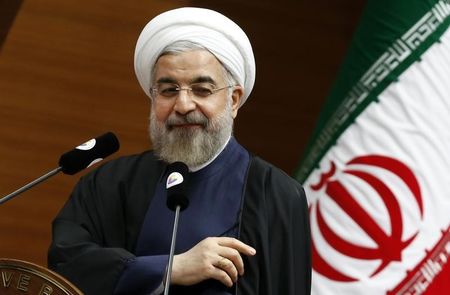By Louis Charbonneau
UNITED NATIONS (Reuters) - Iranian President Hassan Rouhani's promises of greater freedoms for the Islamic Republic have not resulted in any major improvements regarding human rights and freedom of expression, the U.N. chief said in a new report on Iran.
U.N. Secretary-General Ban Ki-moon's annual report to the General Assembly on human rights in Iran, obtained by Reuters on Friday, also expressed alarm at the reported recent increase in executions in Iran.
"President Rouhani has pledged to decrease restrictions on freedom of expression and to ensure security for the press," the report said. "Unfortunately, those promises have not yet led to significant improvements, and restrictions on freedom of expression continue to affect many areas of life."
But reporters, Ban said, continue to face restrictions and other difficulties.
"Journalists and other media personnel are frequently summoned or detained by the judiciary or face harassment and attacks by security forces," his report said.
Rouhani, who took office in August 2013, promised in April that religious and ethnic minorities "must feel justice." Also in April, the head of Iran's High Council for Human Rights said members of the Baha'i community, which has been persecuted, were entitled to the same rights as all Iranian citizens.
"However, discrimination against ethnic and religious minorities reportedly persists both in law and in practice," the report said. "Baha'is remain barred from access to higher education and government employment; they also continue to experience governmental interference in private employment."
Another promise Rouhani has not delivered on is related to Internet censorship, the report said. In remarks earlier this year that challenged hardliners, Rouhani said Iran should embrace the Internet rather than viewing it as a threat.
"However, the Secretary-General deplores the fact that it appears that these words have not yet been translated into practical measures and that the judiciary has ordered the blocking of many social media platforms and websites," it said.
"It is noteworthy that, while such sites as Twitter and Facebook are blocked for most Iranians, the leadership increasingly uses social media to broadcast messages."
Iran says Internet censorship is necessary to protect its citizens' morals and safeguard against cyberattacks, such as the Stuxnet computer virus that corrupted software in nuclear centrifuges and caused them to self-destruct.
Ban's report also raises concerns about the increase in the number of executions last year. According to Cornell University Law School's Deathpenaltyworldwide.org database, there were between 624 and 727 executions in Iran last year. Estimates for 2012 executions range from 314 to 580.
The vast major of those executed, Ban said, are for drug-related offenses. He also criticized Tehran for carrying out death sentences on juveniles.
"According to information gathered from reliable sources, more than 160 juveniles are currently on death row and at least two have been executed in recent months for crimes that they committed when they were younger than 18," Ban's report said.

According to Deathpenaltyworldwide.org, there are currently at least 2,000 people on death row in Iran.
(Additional reporting by Stephanie Nebehay in Geneva; Editing by Lisa Shumaker)
